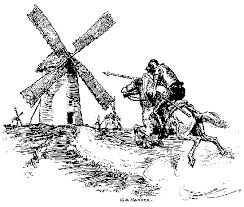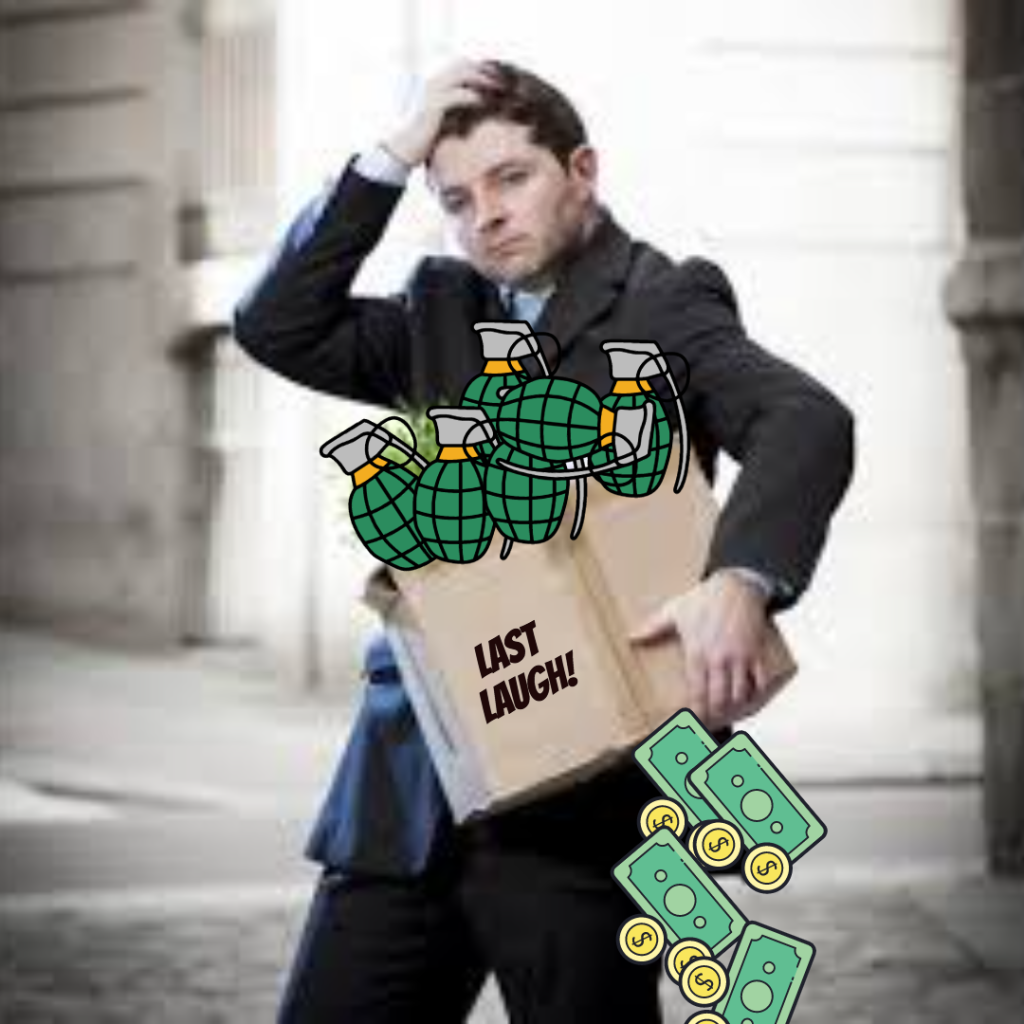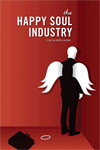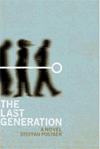Chasing Windmills
January 14, 2021

Continued from previous post…
Looking back, the corner office and all its trappings could be summed up via the old expression: be careful what you wish for. You’d gotten the carrot only to find out you didn’t like carrots. You’d grabbed the brass ring but it hurt like hell holding on. Climbing the ladder you hadn’t realized the rungs below would disappear until it was too late. There was no stepping down a few lengths to adjust, catch your breath, and assess the view. You had to keep climbing or plummet, which is exactly what happened. This was not to say certain ambitious and notorious colleagues hadn’t greased the rungs, expediting your fall; they had.
Came a time there wasn’t a safety net. No cushy job after the severance. No friends to catch you, even those you’d helped on their own ladders to the top. You try not to be bitter. What good would it do? Resentments were like taking poison and expecting others to suffer.
Enlightenment didn’t prevent you from occasionally trolling these pricks. Waves of resentment rolled in now and again, like the king tides in Marin, defeating you. Maybe you turned to the Internet, desperately trying to find an outlet for your vitriol. Mercifully, mostly, you never pressed send.
You remember the day you crossed the one hundred thousand dollar mark. When you were 30 years old, and recently married. You took Sarah out to celebrate, sat across from her in the restaurant, maybe even held her hand, speaking about the future as if it were a gift. If you ever were in love with her it was then, when nothing felt impossible. That night even drinking too much seemed fine. You don’t remember if you and Sarah made love but it hardly mattered. Intoxicated, the two of you. The next morning hangovers were pleasant. Lazing together in pajamas, drinking coffee, reading the paper, gazing at homes in the real estate section, day dreaming about the fantastic tomorrows both of you would share.
And yet, even then, you knew money was most of all a yardstick for your ego. Titles would serve the same purpose. Copywriter. Senior Writer. Associate Creative Director. Creative Director. Vice President. Group Creative Director. Senior Vice President. Executive Creative Director. Rungs in the ladder. Notches in your belt.
Perhaps after achieving success, as was accused, you became complacent. It’s possible. You had made compromises, believing certain situations required it. You must wonder about that now.
You were most content when your work got noticed, won awards and attracted people to you. One campaign in particular ran the table at all the award shows, garnering praise around the world. It would become the agency’s show pony, and you rode it proudly. The best whore in the whorehouse and you were its pimp. The man. Waiting for an elevator at work, a group of marketing students gathered behind you. You heard one of them excitedly whisper to his mate. “That’s him!” He was talking about you. “No fucking way,” the other guy said.
Way.
Being revered was beyond anything you’d ever experienced, more gratifying than your promotions and trophies. And it had come unsolicited. Out of the ether! For what seemed like the first time, you’d been noticed for greatness not flaws. No longer were you the fat kid punched in the gut and crucified on the diving board. You were special, with proof. You’d waited so long for that moment had fantasized about it. Comeuppance. By then the fantasy was less about smashing your tormentors and more about gaining respect and validation. You had no idea what it would look like until that afternoon by the elevators, when the world shifted, ever so slightly, favoring you.
You chased that feeling like the drug that it was, madly looking for it in every promotion, every raise, every accolade. It was never enough but the next one would be.
Relationships and family took a back seat. Any idiot could find a mate and have babies. Friends were transient. Parents weren’t there. Finally, you had something you could control. What you craved was conditional and directly related to your accomplishments. Your vocation became the most important thing in your life. You drank. You got high. But it was just a byproduct of success or a panacea to failure. Finally, you had a calling.
You were chasing windmills.
Problem Child with a High Salary
January 11, 2021

You had lofty titles: Executive Creative Director, Chief Creative Officer, even Executive Chairman. You were on the board of directors at the most famous advertising agency in Chicago, supposedly the youngest member ever. During this period you commanded a huge salary, more than the President of the United States. Frankly, a lot more, especially when you factored in bonuses and stock options. You earned it; well maybe not all of it and toward the end probably less. Then you got asked to leave, to seek opportunities elsewhere, fired. The last time was probably the mortal blow. You didn’t know it but the job you had now was not going to last.
When it came to work, you were only great at two things: copywriting and presentations. You wrote your way into the boardrooms of the world, turning words over and over until they shone like gemstones. Once there, you would sell. Oh, could you ever! You loved selling and did not demure from it like so many other creative people. Those fools, you thought. Didn’t they know advertising and selling went hand in hand? Processing stage fright into stage-might, you had utter command. At times, it was breathtaking. You were excited to perform and it showed. Your confidence seldom came off as a con. During presentations you were like a kid unwrapping gifts at Christmas.
Alas, while showmanship mattered on the way up, once there, not so much. As a director, they wanted you to hire and fire; delegate and operate; things you came to realize you weren’t very good at. You liked to write and sell work. Truth be told, you weren’t interested in the other stuff. It all seemed beside the point, what you had to do as opposed what you wanted to do. Now it was you who was playing the fool.
At best, you’d possessed what the CEO called, “emotional intelligence,” a backhanded compliment, a quality your peers pretended to admire then grew to despise. In management meetings you lectured that creativity was messy and impossible to regimen. But alas, your left-brain partners valued process over intuition. They lacked patience for the soft skills inherent in the creation of ideas. They couldn’t scope it. So they loathed it. For a so-called creative agency this was, in your view, anathema. And so you had refused to whip your troops into creating. You put good ideas on the wall, and quickly. But it was never enough. Eventually, you became a problem child with a very high salary.
to be continued…
The whine of sour grapes or telling my truth and not giving a damn!
December 30, 2020

Been a long time since I wrote about advertising. Why then is my blog called Gods of Advertising if I’m not writing about it? Well, for starters, what is there to write about? From a creative perspective, advertising became irrelevant around the time I did. You can quibble over the year and other details, perhaps cite a few exceptions, but you cannot deny the fact that few consumers (aka people with money to spend) pay advertising any heed. Save for the bottomless pit of transactional messaging permeating our screens, there isn’t much to write home about. Hasn’t been for years. I would say that 75% of every marketing dollar is spent on cliché’ ridden, data driven crap. Creativity in advertising was sick way before Corona virus. Now, it’s on life support.
Not long ago, the so-called Gods of Advertising (always meant to be an ironic term) wishfully opined that the key to remaining relevant in the digital age (let’s say turn of the century) was in mastering social currency. Fearing obsolescence, big shot creative directors like myself and planners and other alleged ad-ninjas went to places like Hyper Island to learn the magic of these new tinier screens and the people who used them. Unfortunately, the bean counters beat us to the punch. Big data replaced the big idea and, well, here we are. There’s more to it than that but I don’t want to write about it any more than you want to read it.
When I unceremoniously exited the business, the writing was on the walls. It sure as hell wasn’t on the page. Copy had turned to content. Strategy became a numbers game. Art directors made shit fast… or else. The result: the aforementioned cliché ridden, data driven transactional crap – also known as content.
For years, I avoided talking this talk because I wanted to believe otherwise. And I was afraid of becoming unemployable. Happened anyway. Now I don’t care and neither does anyone else. I still enjoy writing for clients but for them a big idea is merely converting a strategy line into something they can use until the next quarter rolls around. I’m good at it. And I work fast and cheap. What we all appreciate is the lack of illusion about what we are doing.
Fact. Most clients think Cannes is a sexy place to go on vacation. Period. Where James Bond movies are filmed. Some may remember a celebration of creativity. Like holiday parties. Or bonuses. The mythical Gold Lion is now extinct. Mine are in a storage unit in San Rafael.
You know what? I don’t care anymore. Deep down I wonder if I ever did. I always knew I was getting paid a shit ton of money for doing something intuitive and fun. Once those two criteria were removed –as they have been- all that remained is all that’s left.
Once upon a time, poets were considered special. They had currency. Were celebrated, studied, emulated and revered. Then they faded into the middle pages of the New Yorker. Once upon a time, from 1965 until 2005, (a mere 40 years!), creativity actually mattered. It was like the poetry of yore. And then no one gave a shit about it either.
Not so gentle reader – Would you like me to squeeze the sour grapes further? Relish the whine of discontent? Let me know… I’m in a mood.
Manifestos Matter! May I Write One For You?
August 24, 2020

My Laptop, a Monster Zero and Thou!
Nothing suits me more than writing a good manifesto! I know I am not alone. Most copywriters get off on writing manifestos. At least they’d better. Writing such documents is at the heart of what we do, and can do, for our clients.
Most of you know what I’m talking about. For those unawares, a manifesto (aka mantra or anthem) is the bringing to life in words the highest and most noble aspirations of its subject.
Yes, it is advertising copy but in the best sense of the word. Recall Apple’s great script to the modern world: Think Different. Consider the lines that first and forever defined Nike to a generation: Just Do It. We know these iconic tags because we fell in love with the manifestos. Frankly, neither line would have lasted this long, or even gotten out the door, if not for their beloved manifestos.
The power and glory of a brilliant manifesto cannot be overstated. They raise the hairs on the back of your neck. They make CMO’s smile. They win pitches. Most of all they change things: attitudes, behaviors, even lives.
At least the good ones do.
Into these haloed paragraphs we put everything we know or think we know about writing, about persuading, about life. Here you won’t find speeds and feeds, racks and stacks or friends and family. None of that.
May I write one for you?
https://www.steffanpostaer.com/
Boundless passion for developing creative business ideas, winning new accounts, and elevating a company’s creative profile.
Author Unknown (Pt. 4)
July 12, 2020

Promoting yourself made you as many enemies as fans. Haters relentlessly trolled you online calling you untalented, vainglorious or worse. Colleagues wondered if you were paying more attention to your novels than your job. Your wife thought you were chasing windmills. To some extent they all were right. But the genie was out of the bottle; you simply had to keep trying. Something would click. You would have the last laugh.
One morning, you saw a complete stranger reading your novel on the “El” in Chicago. Small sample, but no less thrilling, it was all you could do to keep from introducing yourself to the reader. In terms of validation this rare sighting would have to do.
Much later, your daughter’s high school art teacher read two of your novels, one after the other. During that relatively long period of time, he had constantly told her how good they were. Your daughter respected her teacher and by him praising your work you knew she respected you. Any glimmer of awe she had towards you was significant. Especially given how you’d fallen from her pedestal. This would have to do.
The accolades you received for copywriting, the wealth it provided, ego trips. For many, that would have done quite nicely. For you it wasn’t enough. Like Icarus you’d reached sublime heights, until your wings got clipped and you fell to earth.
In the end as in the beginning, a writer writes. Writing for its own sake, without the obsession for income or outcome. A writer writes. This, too, will have to do.
(If you’re interested in any of my books please click on the links right side of this blog. Thank you!)



 The Happy Soul Industry
The Happy Soul Industry The Last Generation
The Last Generation